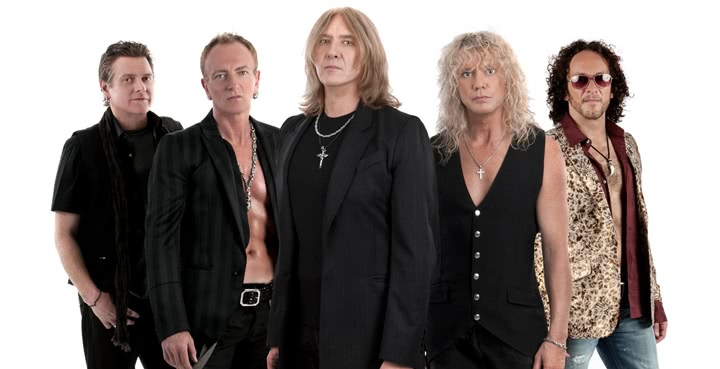Def Leppard have sold more than 100 million albums now, and releases like Hysteria and Pyromania are consistently listed among the best records – ever.
Not bad for an act that not only still remains successful, but after nearly 40 years, is performing stronger than ever. Guitarist Phil Collen talks to the BRAG about what first attracted him to the fledgling heavy metal outfit in 1982.
“They were trying to do something a little different,” he recalls in a measured, Hackney/Californian hybrid. “What always happens – and this is something you can take to any genre of music, any art form, any movie, any book, anything that has even a slight modicum of success – is you get copies. What I liked about the guys from Def Leppard, even from the first album, was they were trying to attempt something a little different to all the others. I find nothing as boring as when everyone is just trying to make the same thing, so there was a spark there that I liked.
“But I especially think being open-minded was important then. Particularly around [1987 release] Hysteria, which sort of fused and blended pop and rock in a new way. Run-D.M.C. were also fusing sounds then, there were all of these really exciting music blends on the radio, and so we thought, ‘Why not see where that leads?’”
Collen joined the group in the midst of recording their third album, Pyromania, and while Def Leppard were already a band on the rise, it was this release that would topple all expectations. Within a year, they would be rated as a favoured rock band over other seminal acts like The Rolling Stones and AC/DC, and were on their way to securing the first of two diamond certifications. The early ’80s was a vibrant time for stadium bands, and while there was inevitably great excess and darkness that accompanied many groups’ trajectories, Def Leppard carved out longevity through a work ethic and appreciation for the art that Collen finds quite rare in music today.
“There was great music being made then,” he says. “That time period was really quite symbolic, when the art form turned into a business. After that, we lost a lot of the art. There were, and still are, a lot of great artists out there doing their thing, but it’s different. But we were right on the cusp of things changing, when it all became about image and the MTV culture. It changed, and I don’t think it’s ever going to be like it was. That period was unique, and now it’s just another thing.
“I think it was a lot more important in people’s lives then, and now a lot of music is just a backdrop to other stuff. It’s a backdrop to, ‘Hey, aren’t I sexy!’ The whole Kim Kardashian, Beyoncé thing. There’s a lot going on there, but it’s not really related to the art anymore. It’s all of these other things, it’s all image. But I suppose that’s just the new generation, and that’s all a reflection of it.”
If there is cynicism to Collen’s words, it isn’t entirely unfounded. For many performers today, image and self-promotion do indeed come at the expense of the music, though Collen himself would be the first to acknowledge there are exceptions to the rule. However, he is adamant that the motivation behind the music is key, and if you are not working tirelessly at your art for the sake of expression alone, then you are in the game for the wrong reasons.
“We put so much effort into [the band]. I mean, if we’d put that work in and hadn’t succeeded, we’d have been really pissed off!” he laughs. “But it’s all about the work. For me, it was also a tool of expression. I learnt to play guitar and to write songs. There’s a great thing about painting or poetry, music, whatever, just creating something when you’re young. You lack the communication skills with other people then – with your parents, other people – and it allows you to let off steam like a valve. I never had much teenage angst because I was able to do that with the music. Some kids can do that with sport, and then they get old and can’t quite do it anymore and so they don’t have that release.
“But the reward for me has stayed the same thing. I still get this amazing, monumental buzz out of creating something. I can still bring myself to tears writing something, coming up with some story and pulling it together like a jigsaw puzzle. It’s all about expressing yourself artistically – that is the reward. Everything else was gravy. You ask a lot of kids what do they want from it, and they go, ‘I want people to pay attention to me.’ And that’s an interesting thing. Whether that’s parental or the culture right now, I don’t know, but it looks nasty to me. We’re in a pretty weird place.”
Def Leppard rock Qantas Credit Union Arena, with Live and Baby Animals, on Tuesday November 17.


































